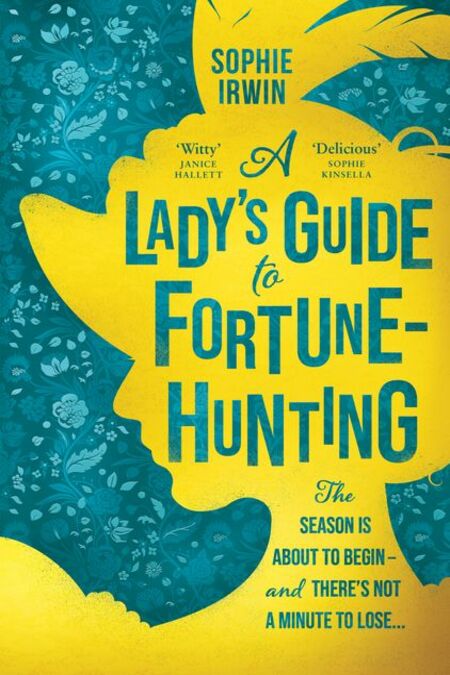When you pick up a book with the invitingly whimsical title, A Lady’s Guide to Fortune-Hunting, which is set in 1818 London during the height of the Season when balls are held and marriages sealed among the English elite known as the ton, you have every right to expect there will be sly wit, comedic bounce, zestful exchanges and a narrative playfulness that sees key characters sparring and destinies being chased.
In this gloriously good instance, all your expectations are fulfilled with Sophie Irwin’s sublimely spirited novel bringing the era alive with vivacity and mischievous humour and a salient understanding that for all the wealth of a certain stratified section of society, there are a greater others perilously pivoting on the cusp of financial ruin and societal oblivion.
One of those people is the protagonist Kitty Talbot who needs a fortune in a hurry.
But of course, this is late Regency England and the only people free to build up the kind of fortune Kitty needs are men, meaning that Kitty, whose parents have died leaving colossal debt for their five daughters to shoulder, debt which is about to come due and kick them out of their home into uncertain futures, must find a husband … and quickly!
Her only option is launching herself into the ravenous maw of English society where the wrong degree of curtsy or an impolitic word is enough to see you censured and cast never to exchange an insipid worth with a cosseted elite ever again.
“Kitty rolled onto her side, trying to marshal her rebellious thoughts into order. It was useless to ruminate upon matters she could not possibly change. Her mother was gone, and this was Kitty’s task alone to bear, now. Aunt Dorothy was the only advisor she had, and she had laughed when Kitty had asked after men of greater fortune than Mr Pears. The laughter had not been malicious; she had honestly considered it absurd, and perhaps Kitty should heed that.” (P. 27)
In other circumstance that would be just fine for Kitty, who doesn’t have a shallow bone in her body and who, as the eldest child, is willing to do whatever it takes to secure her family’s financial future, but needs must and all that and so, she is forced to pretend to love one wealthy gentleman after another, some of them engaging, others most certainly not but all of them equipped with funds sufficient to save Kitty, her sister Cecily and three younger siblings from the poor house.
Much of the effervescent fun of A Lady’s Guide to Fortune-Hunting, and it is a great deal of fun even as it honestly documents how tough life could be without the cushion of impossible wealth, is watching Kitty continually push down who she is so she can land a man with cash.
She is, at heart, a good and loyal person, but she is also determined and forthright, and while there are moments of guilt, precipitating a Sliding Doors decision which may cost her if she does the right thing – that in itself is a grey area since getting a husband and paying off her family’s debt is as right as it gets for her at the time but then if it hurts someone else, can she honestly live with that? – she is going to succeed in her mission come what what may.
Enter Lord Radcliffe aka James de Lacy, a man so rich that paying off Kitty’s debt would be a mere trifle; but he is the older brother of Archibald de Lacy, a young man, barely 21, who is smitten with Kitty who plays him like a fish on the line, getting him to the point where all she needs is the approval of James and his widowed mother, Lady Radcliffe, to seal the marital deal.
This is, of course, where things get really fun.
Embodying a Austen-eseque vibe that is entirely Irwin’s own while winningly tipping the fashionable hat to the work of the celebrated nineteenth-century novelist, A Lady’s Guide to Fortune-Hunting becomes a joyously spirited romp through ball after ball, museum visit after park perambulation, as Kitty, full of tenacity, determination and an unwillingness to yield to either orthodoxy or convention (though she is scrupulous for the most part around the elite whose acceptance she needs) finds herself blocked almost at every turn by James who is not willing to let succeed in snatching Archibald aka Archie away from the safe confines of his family.
A veteran of the Napoleonic Wars where he acted as an aide to the Duke of Wellington, James is wary of plunging back into society, still suffering from a PTSD which makes a mockery of his onetime love of gambling, drinking and flirting, his return to London only happening because his mother fears Archie is in trouble.
Grounded and all too aware of the fragility and vagaries of life in a way his ton compatriots are not, and likely never will be, James is the perfect match for Kitty who may have been forced to play by the elite’s rules to keep her family’s head above water, but who is, at heart, a person of integrity and loyalty who, when she is not sparring with her adversary, finds herself unexpectedly sharing intimate insights into her life which are reciprocated by a Lord who sees far more to life now than sitting in parliament and dancing and drinking.
“There was a palpable sense of urgency amongst the ton, that night, as if they were all – just as Kitty was – intensely aware that time was running out. Perhaps she was not the only one conscious of the rising expense and diminishing opportunity of the remaining London Season. The dances were quicker, the champagne drunk faster, the laughter louder – the whole room infused with a frantic sort of energy.” (P. 226)
A Lady’s Guide to Fortune-Hunting is a slice of confected wonder and brilliance.
Funny, sprightly and alive with possibility, the novel shines a light on the hypocrisy of those at the height of English society in 1818 while affirming that those who dare to challenge it, even while playing within its rules, may have a chance of finding happiness after all.
In fact, as is often the way with Austen’s characters, James and Kitty, who though they might be adversaries now, could yet find there is something far deeper and unexpected that binds them, while those around them such as Cecily and the girls’ Aunt Dorothy (of the family friend variety with a past of her own that won’t pass muster with the ton were it exposed) may find fate offering surprising delights.
In other words, while observing convention may gain some sort of short-term protection and gain, there is a lots that you must forgo to secure it, and in A Lady’s Guide to Fortune-Hunting Irwin is constantly dangling the prospect, which is deliciously marvellously thrilling, of those who don’t fit the mold actually entering up all the better for it.
It’s a fairytale fantasy but my god in Irwin’s expert hands, it is a beguiling and wondrous one, so seductively escapist and full of cruel fate-evading possibility that you will be buoyed up for days afterwards, in love with Kitty and her wherewithal and hoping that she can, along with James, finding happiness in the face of every attempt to snatch it away from her.

